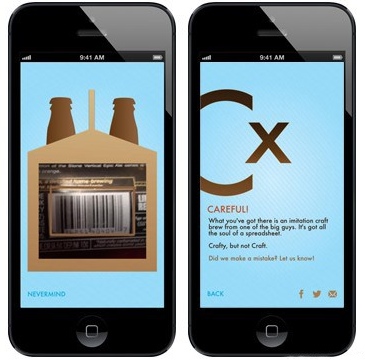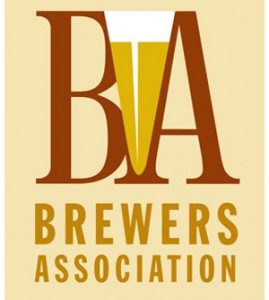
Now there’s an app for that.
Craft Check, a 99-cent iPhone app that allows beer consumers to scan barcodes on beer bottles, cans and multi-packs, takes the figurative mask off of so-called “crafty” beers like Blue Moon and Shock Top that many die-hard beer enthusiasts would claim are masquerading as their legitimate craft competitors.
Scan the barcode of any beer that doesn’t meet the Brewers Association’s expectations of what it means to be a “craft brewer” — small (less than 6 million barrels annually), independent (no more than 25 percent owned by a non-craft competitor) and traditional (a brewer that has a majority of its total beverage alcohol volume in beers who flavor derives from traditional or innovating brewing ingredients) — and you’ll get this message:
“CAREFUL! What you’ve got there is an imitation craft brew from one of the big guys. It’s got all the soul of a spreadsheet. Crafty, but not Craft.”
Craft Check, which was not made in affiliation with the BA, was released last December, but its availability on the iTunes App Store wasn’t widely known until Fortune profiled the company on March 5 — two days after the Brewers Association announced it had revised its definition of a craft brewer.

And the CBA isn’t happy about it: Brewbound obtained an internal email, sent to hundreds of CBA employees on March 6, that paints a pretty clear picture of how Thomas views an ever-changing assessment of the craft beer landscape.
“Definitions will come and go,” Thomas wrote,“And, they will change as surely as the market does; this latest BA announcement is a very current reminder of that. What will never change is our DNA. As Redhook turns 33, as Widmer Brothers turns 30 and as Kona turns 20, we can maturely and confidently define ourselves; we don’t need others to do that for us.”
Thomas is right about the definitional shifts that have accompanied craft beer standards. In 1996, the Association of Brewers — which in 2005 merged with the Brewers Association of America to form the Brewers Association as it exists today — set forth its first definition of a craft brewer.
The early craft brewer definition condoned contract brewing and excluded companies with 25 percent ownership by non-craft brewers or whose recipes contained more than 10 percent adjunct, corn, or rice. That meant that Redhook, which had inked a deal with Anheuser-Busch that guaranteed the brand access to AB’s nationwide distribution network in exchange for 32 percent of the company in 1994, was no longer “craft;” neither was Widmer Brothers, which made a similar deal with AB in 1997.

Last week, the BA again changed its definition, loosening the restrictions on what “traditional” means, allowing brewers like Yuengling and August Schell — whose majority of annual production volume is beer made with “adjunct” ingredients — back into the club.
Paul Gatza, the director of the BA, told Brewbound that the new definition prioritizes size and ownership.
“Small, independent, local roots — those types of ideas are really what we have been emphasizing all along,” he said. “Brewers who had been in business for 150-plus years weren’t considered traditional under our definition and we are seeing more craft brewers who are experimenting with adjunct grains or simple sugars.”
Here’s the text of Thomas’ email to CBA’s 745 employees:
Team CBA,
Earlier this week, the Brewers Association (BA) announced that it had revised its definition of ‘craft brewer,’ purportedly to “better reflect the evolution within” our industry.

To the disappointment of some, the BA chose not to modify its definition with respect to ‘ownership’. Instead it opted to increase the size that it considers a brewer to be ‘small’ and relaxed the definition of which brewing ingredients it considers to be “traditional.”
It’s easy to editorialize with respect to the intent and integrity of these changes. In fact, in the not-so-distant past, I have publically been very vocal about my personal opinions with respect to the arbitrary and suggestive ‘labeling’ of beers and brewers by those within the industry — including the BA and others. That said, I wanted to take the opportunity to remind everyone at CBA that for all of us, and increasingly for consumers, it’s not about what someone chooses to call us, it’s about who we are and what we brew. And, we should never believe that what a trade organization says changes who we are.
As I repeatedly and proudly say, at CBA we have the soul of a craft brewer and the body of a big brewer. Our soul is infused with the pioneering spirit that gave birth to the craft brewing movement itself over 30 years ago — a decade before others decided to define that movement in a way that excluded its very founders, fragmented the industry and gave way to years of petty labeling and name calling. Our soul is — and has always been – the spirit of craft brewing. It’s the spirit that compelled Paul Shipman to not only begin Redhook over 32 years ago, but to expand his brewing footprint from West to East a full 15 years before anyone else in the segment even considered it. It’s the spirit that guided Kurt & Rob Widmer’s vision 30 years ago and gave birth to The Original American Hefeweizen, an iconic beer that literally launched millions of barrels of knock-offs. It’s the spirit that inspired Cameron Healy and his son Spoon 20 years ago to answer the calling to bring together the proud, authentic ethos of Hawaii with an authentic craft beer brewed in Kona.
Definitions will come and go. And, they will change as surely as the market does; this latest BA announcement is a very current reminder of that. What will never change is our DNA. As Redhook turns 33, as Widmer Brothers turns 30 and as Kona turns 20, we can maturely and confidently define ourselves; we don’t need others to do that for us.
You can all continue to be proud of who we were and who you are helping us to be.
- We craft outstanding, innovative brews
- We craft vibrant, dynamic brands
- We craft beers with world class consistency in multiple world class breweries
- We craft enduring relationships with trade partners big and small alike
- We craft outstanding customer service to our wholesalers and retailers and we do it unapologetically and proudly through the finest network of wholesalers in the country
We will continue to proudly craft a more enriching beer experience for beer drinkers from sea-to-shining sea and even across the globe — regardless of what anyone else calls our breweries, our brewers, our brands, our beers, or our consumers. I just call them lucky.
